“There is a strong difference between male and female directors”: An interview with The Intruder actor Érica Rivas

Argentine actress Érica Rivas established herself in her native country by appearing in the local remake of the US sitcom Married… with Children back in the mid 2000s, although international audiences might know her best from her work in Francis Ford Coppola’s Tetro. She takes the lead in director Natalia Meta’s El Prófugo, playing Inés, a voice dubbing artist beset by tragedy which quickly escalates into all-out weirdness. We talked to Érica shortly after the film’s premiere in competition at this year’s Berlin International Film Festival.
Inés is facing a reality that quickly becomes distorted. How do you exercise restraint with such a character – how do you find the line of where you might be in danger of overplaying things?
I see Inés as being on the border, really – in an in-between world between fact and fantasy, between dreams and wakefulness in a way, and if you will, a world dominated by a paradigm, a paternalistic patriarchal paradigm, and the impulse given to her by her desires as a woman. To me, she’s at a point in her life that I like to compare to adolescence in a way. Where there are strong bodily changes taking place, and there are differences that are happening to her.
As an actress, do you relate to this concept of a distorted reality?
Yes, I absolutely agree, and to me, this is the only way. As an actress, as an artist, it is very important to me, but also as a person – really to think about going to that borderline, where things are not clear, and to try to rethink ourselves from that position – to rethink our priorities and relationships, and realities that exist in the current world, because as we speak, the world is on fire. Therefore, I think it’s very important to think about these borderline situations where things are not as clear-cut.
Your character goes through a liberation of sorts. Do you think of her as being oppressed, perhaps by the men in her life?
I think that the agents of oppression are not men as such, but it’s patriarchy, it’s capitalism, it’s a form of colonialism. Those are the real agents of oppression, and they are all working in the same way. It’s not really linked to whether you have male or female sexual organs – that is not really what it is. It’s linked to structures that precede us, and are weighing down on us, weighing down on both men and women alike. So I do think there’s a very potent, a very strong metaphor, coming back to your question.
Berlinale is attempting to achieve gender parity in its selection, even though it’s not quite there yet. Do you think there’s actually a difference between male and female filmmakers?
Yes, first of all, I can completely confirm that there is a strong difference, and something that I’ve really noted in working with female directors is that they really put their own life experience into their work – their own life is translated into their work, and that’s something that is very different with men. With men, there’s always the question of how much of their own narrative – their own story – they want to put into the film as they tell it. Whereas, with women, with female directors, it’s always that they share their very intimate experiences, their own life experience with the entire cast, and the entire team.
Oliver Johnston
Image: Érica Rivas in The Intruder © Rei Cine SRL/Picnic Producciones SRL
The Intruder (El Prófugo) does not have a UK release date yet.
Read more reviews from our Berlin Film Festival 2020 coverage here.
For further information about the event visit the Berlin Film Festival website here.
Watch the trailer for The Intruder (El Prófugo) here:























Facebook
Twitter
Instagram
YouTube
RSS